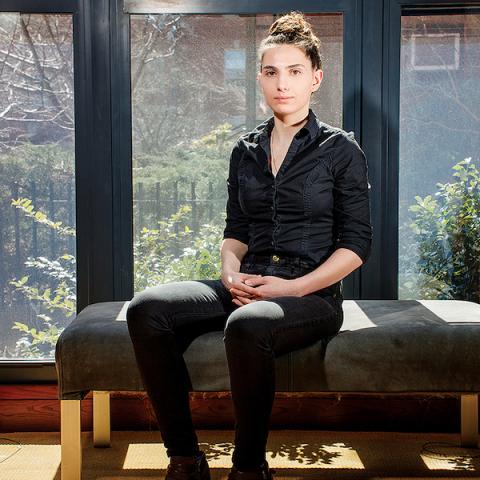The power of pain

By Brown Alumni Magazine
It’s mid-April and Emily Siff ’19 just got out of the hospital, where she spent a few days experiencing pain that opioids weren’t addressing. “It was overcrowded and noisy,” she recalls. “There was no way to sleep, so I started doing statistics homework. It was so relaxing.”
Siff was diagnosed at 14 with an incurable, congenital illness. It causes her constant fatigue and pain—and, to date, 14 surgeries—but she won’t disclose it. “When you have a chronic illness, you’re in an intimate relationship with it,” she says, “but so many things impede the ability to be a private person.” “Just the way that the hospital system objectifies you. So I’ve decided I had to keep at least one part of myself private.”
What she will discuss is how living with an illness has driven her. In the fall, via Brown’s combined degree program, she’ll graduate with not only a bachelor’s degree in literary arts but also a bachelor’s and master’s in cognitive science. Even before Brown, “school became a lifeline because my disease drove me to explore. I don’t know if I would’ve become interested in the sciences if I hadn’t been constantly interacting with doctors.”
Plus, she says, she notices the pain less when mentally immersed. So does she ever relax? “All my time is scheduled, but I consider most of it free time because I’m doing things I want to. I go to extra classes just for fun. And my friends are also work-focused, so we spend time together studying instead of going out dancing.”
She works in two labs, sociology and psychology, where she studies things like how power dynamics play out over the use of nonverbal communications like emojis. “I’m interested in answering questions that social scientists ask through a biochemical approach,” she says. “Biochemical questions are just like, how would you make a synthesis to form this molecule? Social science questions are more like, how does the mind work, how do you link knowledge and action?”
She mentors in three programs. Two are on campus: the Matched Advising Program for Sophomores, which gives academic support to second-years; and Women in Science and Engineering, a Sarah Doyle program that brings students together with science faculty. Then there’s The Adolescent Leadership Council, a program at Hasbro Children’s Hospital, in which she and others with illnesses or disabilities nurture kids who also have those things. “It’s cathartic,” she says, “because I’ve realized how unspecific my experiences are.”
That’s reflected in the book she’s writing for literary arts, Bolt From Blue, about a teenager with an incurable condition: “Part of the book is about the universality of dealing with shit, whether it’s illness, losing an arm, or sucking at math. Everyone has their issues.”
After Brown, she’ll seek a Ph.D., possibly in cognitive neuroscience: “I think I’ll be happy as an academic.” How is all this possible in the face of chronic illness? “A lot of times people don’t know what they have,” answers Siff. “Knowing what I can’t have makes me value what I do have much more. I got really lucky that the thing I enjoy doing is learning.”—T. M.



